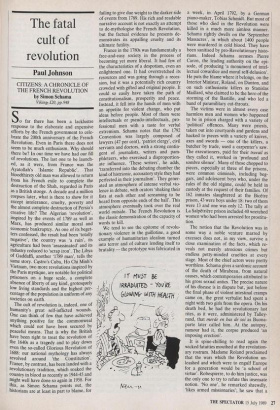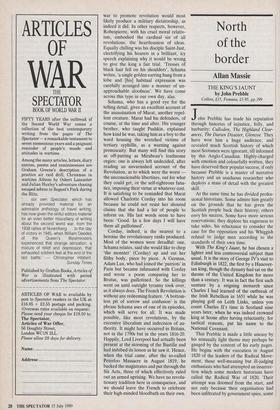The fatal cult of revolution
Paul Johnson
CITIZENS: A CHRONICLE OF THE FRENCH REVOLUTION by Simon Schama Viking; £20, pp.948 So far there has been a lacklustre response to the elaborate and expensive efforts by the French government to cele- brate the 200th anniversary of the French Revolution. Even in Paris there does not seem to be much enthusiasm. Why should there be? In our time we have had our fill of revolutions. The last one to be launch- ed, as it were, from France was the Ayatollah's 'Islamic Republic'. That bloodthirsty old man was allowed to return from his French exile to complete the destruction of the Shah, regarded in Paris as a British stooge. A decade and a million corpses later, what is there to show for it except intolerance, cruelty, poverty and the almost complete destruction of Persia's creative life? The Algerian 'revolution', inspired by the events of 1789 as well as Marx, has produced similar moral and economic bankruptcy. As one of its,beget- ters confessed, the result had been 'totally negative', the country was 'a ruin', its agriculture had been 'assassinated' and its industry reduced to 'scrap iron'. The Libya of Gaddaffi, another '1789 man', tells the same story. Castro's Cuba, Ho Chi Minh's Vietnam, two more revolutions inspired by the Paris mystique, are notable for political prisoners on a huge - scale, a complete absence of liberty of any kind, grotesquely low living standards and the highest per- centage of the population in uniform of any societies on earth.
The cult of revolution is, indeed, one of humanity's great self-inflicted wounds. One can think of few that have achieved anything positive for the commonweal which could not have been secured by peaceful means. That is why the British have been right to treat the revolution of the 1640s as a tragedy and to play down even the so-called Glorious Revolution of 1688: our national mythology has always revolved around 'the Constitution'. France, by contrast, has been landed with a revolutionary tradition, which soaked the country in blood as recently as 1944-45 and might well have done so again in 1958. For this, as Simon Schama points out, the historians are at least in part to blame, for failing to give due weight to the darker side of events from 1789. His rich and readable narrative account is not exactly an attempt to de-mythologise the French Revolution, but the factual evidence he presents de- monstrates its appalling cruelty and its ultimate futility.
France in the 1780s was fundamentally a free-and-easy society in the process of becoming yet more liberal. It had few of the characteristics of a despotism, even an enlightened one. It had overstretched its resources and was going through a reces- sion, but it was a potentially rich country crowded with gifted and original people. It could so easily have taken the path of constitutionalism, prosperity and peace. Instead, it fell into the hands of men with an appetite for violent change, who put ideas before people. Most of them were intellectuals or pseudo-intellectuals, pro- fessional men with a taste for verbal extremism. Schama notes that the 1792 Convention was largely composed of lawyers (47 per cent), 'patriot clergy', civil servants and doctors, with a strong contin- gent of journalists, writers and pam- phleteers, who exercised a disproportion- ate influence. 'These writers', he adds, 'transferred into the debating chamber the kind of histrionic, accusatory style they had perfected in their journalism'. They gener- ated an atmosphere of intense verbal vio- lence in debate, with orators 'shaking their fists at each other and screaming to be heard from opposite ends of the hall'. This atmosphere eventually took over the real world outside. The French Revolution is the classic demonstration of the capacity of words to kill.
We tend to see the epitome of revolu- tionary violence in the guillotine, a good example of humanitarian idealism turned into terror and of culture lending itself to brutality — the prototype was fabricated in a week, in April 1792, by a German piano-maker, Tobias Schmidt. But most of those who died in the Revolution were killed in a much more aimless manner. Schama rightly dwells on the 'September Massacres', in which about 1400 people were murdered in cold blood. They have been sanitised by pro-Revolutionary histo- rians. Indeed Schama accuses Pierre Caron, the leading authority on the epi- sode, of producing 'a monument of intel- lectual cowardice and moral self-delusion'. He puts the blame where it belongs, on the Interior Minister, Roland, on Danton, and on such enthusiastic killers as Stanislas Maillard, who claimed to be the hero of the storming of the Bastille, and who led a band of paramilitary cut-throats.
The victims were in almost every case harmless men and women who happened to be in prison charged with a variety of `political' offences. Many were priests, taken out into courtyards and gardens and hacked to pieces with a variety of knives, axes and swords — one of the killers, a butcher by trade, used a carpenter's saw. The executioners, paid for their travail as they called it, worked in 'profound and sombre silence'. Many of those chopped to pieces, especially at three of the prisons, were common criminals, including beg- gars, and adolescent boys who, under the rules of the old regime, could be held in custody at the request of their families. Of 162 inmates slaughtered at the Bicetre prison, 43 were boys under 18: two of them were 13 and one was only 12. The tally at La Salpetriere prison included 40 wretched women who had been arrested for prostitu- tion.
The notion that the Revolution was in some way a noble venture marred by excesses does not, in my view, survive a close examination of the facts, which re- veals not merely • atrocious crimes but endless petty-minded cruelties at every stage. Most of the chief actors were pretty worthless. Schama gives a sardonic account of the death of Mirabeau, from natural causes, which contemporaries attributed to his gross sexual antics. The precise nature of his disease is in dispute but, just before the final phase of violent intestinal cramps came on, the great verbalist had spent a night with two girls from the opera. On his death bed, he had the revolutionary last rites, as it were, administered by Talley- rand, that merde en bas de soi as Buona- pane later called him. At the autopsy, rumour had it, the corpse produced 'an imposing erection'.
It is spine-chilling to read again the wicked fatuities mouthed at the revolution- ary rostrum. Madame Roland proclaimed that the wars which the Revolution un- leashed and which were to engulf Europe for a generation would be 'a school of virtue'. Robespierre, to do him justice, was the only one to try to refute this insensate notion. 'No one', he remarked shrewdly, 'likes armed missionaries'; he saw that a , war to promote revolution would most likely produce a military dictatorship, as indeed it did. In other respects, however, Robespierre, with his cruel moral relativ- ism, embodied the cardinal sin of all revolutions, the heartlessness of ideas. Equally chilling was his disciple Saint-Just, electrifying his hearers in a brilliant, icy speech explaining why it would be wrong to give the king a fair trial. 'Tresses of black hair fell on his shoulders', Schama writes, 'a single golden earring hung from a lobe and [his] habitual expression was carefully arranged into a manner of un- approachable aloofness'. We have come across this type in our own day, alas.
Schama, who has a good eye for the telling detail, gives an excellent account of the assassination of Marat, another repel- lent creature. Marat had his defenders, of course, at the time and after. His younger brother, who taught Pushkin, explained how kind he was, taking him as a boy to the ward housing the wretched victims of tertiary syphillis, as a warning against promiscuity. But many will find this story as off-putting as Mirabeau's loathsome orgies: one is always left undecided, after reading an unvarnished account of the Revolution, as to which were the worst the unconscionable libertines, out for what they could get, or the self-righteous fana- tics, imposing their virtue at whatever cost. It is satisfying to be reminded that Marat allowed Charlotte Corday into his room because he could not resist her shouted claims that she had a list of people 'to inform on. His last words seem to have been: 'Good. In a few days I will have them all guillotined'.
Corday, indeed, is the nearest to a heroine the revolutionary ranks produced. Most of the women were dreadful: one, Schama relates, said she would like to chop `the monster' (Corday) up and eat her filthy body, piece by piece. A German, Adam Lux, who had joined the 'patriots' in Paris but became infatuated with Corday and wrote a poem comparing her to Brutus, was guillotined. So the killings went on until outright tyranny took over, as it always does. The French Revolution is without any redeeming feature. 'A bottom- less pit of sorrow and confusion' is the phrase Schama uses of one of its episodes, which will serve for all. It was made possible, like most revolutions, by the excessive liberalism and indecision of au- thority. It might have occurred in Britain, not in the 1790s but in the years 1816-20. Happily, Lord Liverpool had actually been present at the storming of the Bastille and had imbibed its lesson as he saw it. Hence, when the trial came, after the so-called Peterloo Massacre in August 1819, he backed the magistrates and put through the Six Acts, three of which effectively ruled out an armed uprising. We have no revolu- tionary tradition here in consequence, and we should leave the French to celebrate their high-minded bloodbath on their own.



















































 Previous page
Previous page